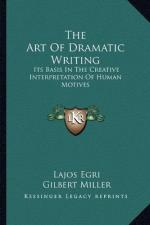
|
| Name: _________________________ | Period: ___________________ |
This test consists of 15 multiple choice questions and 5 short answer questions.
Multiple Choice Questions
1. What philosopher surmised that "every story must have a beginning, middle, and an end"?
(a) Homer.
(b) Aristotle.
(c) Plato.
(d) Socrates.
2. What is the last name of Sorel and Simon in "Hay Fever"?
(a) Bass.
(b) Boone.
(c) Bliss.
(d) Bailston.
3. In one line of dialogue, a character will be delighted with their life, and two lines later, disturbingly mad. What kind of conflict is this an example of?
(a) Unpredictable.
(b) Flip-flop.
(c) Jumping.
(d) Bi-polar.
4. When was "Tobacco Road" first performed?
(a) 1937.
(b) 1933.
(c) 1935.
(d) 1939.
5. What does the author assert environment influences in drama?
(a) Character.
(b) Premise.
(c) Action.
(d) Plot.
6. Who is the object of Tartuffe's lust in "Tartuffe"?
(a) Orgon.
(b) Madame Pernelle.
(c) Elmire.
(d) Mariane.
7. Lajos Egri believes that the greatest fault of the play "Stevedore", is a serious lack of _____.
(a) Transitions.
(b) Plot.
(c) Emotion.
(d) Villains.
8. Hedda Gabler's father in the play of the same name is _____.
(a) A general.
(b) A corporal.
(c) A lieutenant.
(d) A sergeant.
9. Who wrote the play "Idiot's Delight"?
(a) Robert E. Sherwood.
(b) Paul Green.
(c) John Howard Lawson.
(d) Erskine Caldwell.
10. What playwright does the author assert produced badly written plays after World War II had just finished, and dealt with problems rather tame and different, compared to what people had just gone through with the war?
(a) Robert E. Sherwood.
(b) Osias L. Schwarz.
(c) Noel Coward.
(d) Erskine Caldwell.
11. Tartuffe is whose houseguest in the play "Tartuffe"?
(a) Elmire.
(b) Orgon.
(c) Mariane.
(d) Madame Pernelle.
12. Who offers an explanation of dialogue in Book IV: General, Chapter 3: Dialogue?
(a) A student of the author's.
(b) A teacher of the author's.
(c) A famous drama critic.
(d) A layman.
13. Who suffers from inherited syphilis in the play "Ghosts"?
(a) Oswald.
(b) Regina.
(c) Helene.
(d) Jacob.
14. The author believes the writer to be lost if he is spending his time worrying about _____.
(a) What others will think.
(b) The introduction.
(c) The climax.
(d) Developing secondary characters.
15. The action of "Hedda Gabler" takes place in a villa in _____.
(a) Krostein.
(b) Kane.
(c) Krakow.
(d) Christiania.
Short Answer Questions
1. What is the name of Hedda's husband in "Hedda Gabler"?
2. Who wrote the play "Hedda Gabler"?
3. The author writes that transition has the power to connect two emotions that are seemingly _____.
4. In rising conflict, each conflict causes _____.
5. Who is the priest in the play "Ghosts"?
|
This section contains 376 words (approx. 2 pages at 300 words per page) |

|




